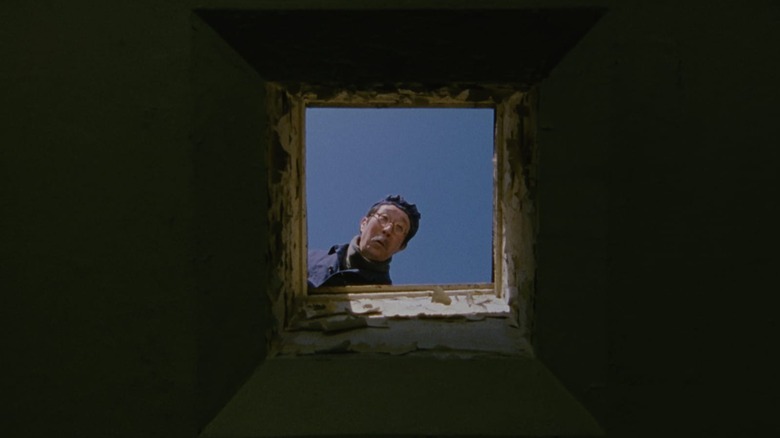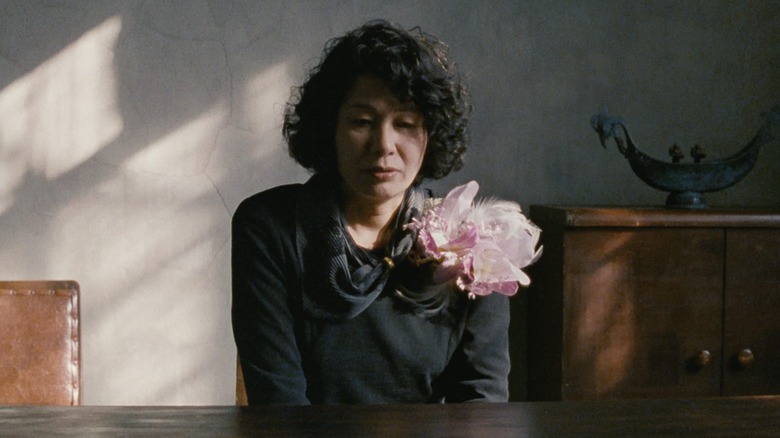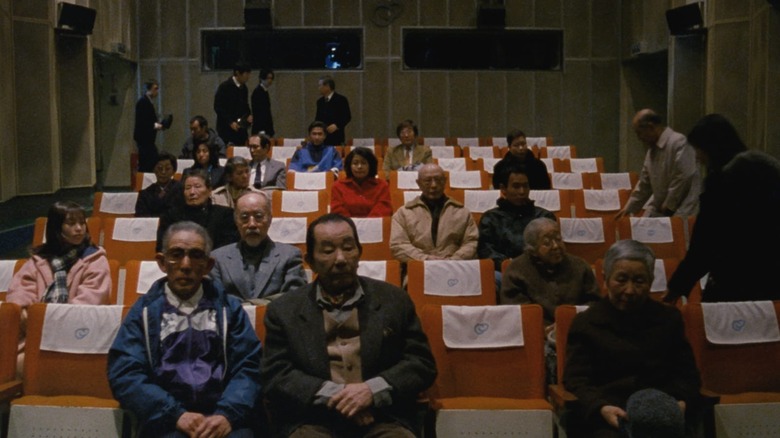The Daily Stream: After Life Gives Life Meaning
(Welcome to The Daily Stream, an ongoing series in which the /Film team shares what they've been watching, why it's worth checking out, and where you can stream it.)
The Movie: After Life
Where You Can Stream It: The Criterion Channel
The Pitch: Is there art after death? Hirokazu Kore-eda presents an afterlife that doesn't just contain movies but is constructed entirely around their making. Life itself, he posits, is the very function of the medium, and springs from deep within the human psyche. And yet, despite its heady themes, "After Life" is no dry essay. It is a gentle, calm, kind, playful parable about the very meaning of life. It's handily one of the best films of its decade
"After Life" has a wonderful premise. Out in the woods somewhere is a run-down, not particularly glamorous community center. Every Monday morning, a group of random strangers gathers at this center, eager to discuss what they do there. A few social workers step forward and announce to the attendees that they are all dead. This is the afterlife, and the community center is but a rest stop on the way to eternity. Each of the attendees will be given a few days to identify their dearest memory from their lives. The social workers will then have a few additional days to reenact said memories on film, having to build accurate sets and use homemade special effects.
When the memory film is complete, the subject will attend a screening. As they watch the film, the attendee will ascend into the ether, a disembodied half-consciousness carrying the singular on-screen memory with them forever. All other memories will be erased from their minds. Heaven is an eternal state of living in one's happiest moment.
What would you choose?
Kore-eda presents the afterlife as (ironically) a very down-to-earth place. it's like a particularly pleasant bus station, or maybe a campground mess hall. It's clean and organized, but this is not a place of Heavenly light or pearl spires. This is a place designed for work. The social workers are part psychologists, part surveyors, and part filmmakers. The dead, meanwhile, are not overwhelmed or saddened by their fate. Very gamely, they sift through their own minds, trying to think of the happiest they had ever been.
One dead man recalls a time he flew a small plane. That requires the building of a plane set for his movie. Another recalls a day on a train, leading the filmmakers to cast extras, sew costumes, and come up with just the right lighting. A teenage girl declares that her best memory was a time she went to Disneyland with her friends. The filmmakers calmly explain that it will be easy to make that film, as many young people tend to choose Disneyland. Upon hearing that, the girl begins to rethink her memory, pondering if she actually closely matches her peers. One old man simply cannot, for the life of him (heh), come up with a memory. The filmmakers help him by sifting through photos, but nothing, he feels, is really worth taking into eternity. The conclusion to his story is heartfelt and beautiful.
Most of the dead people were played by non-actors whom Kore-eda interviewed about their own personal memories. Their frankness on camera is real, their memories true. Kore-eda's interviews make portions of "After Life" feel like a documentary, and it's worth noting that the filmmaker's first three pictures were documentary films. His documentarian eye give the fantastical aspects of "After Life" a startlingly believable feeling.
Life is a low-budget film
The frankness of Kore-eda's camera is powerful enough to casually convince a viewer that the director somehow brought real cameras into the hereafter. This vision of the great beyond is, for cineastes, one of the more appealing.
Kore-eda also openly acknowledges that cinema — the shining wall in the dark room — is a memory-based, transportive experience. What is a filmmaker doing but re-creating memories on camera? What is a scene in a movie but an artistic reinterpretation of a moment in the screenwriter's/director's/filmmaker's life? At the end of the day, human beings are but a collection of their mentally captured life incidents. Our best — and our worst — memories are the ones that linger in our minds for all eternity. Cinema is merely a way to get those memories on record, to provide an ongoing archive of human experience.
"After Life" depicts a world where film not only recreates the intense exhilaration from our own lives, but serves a vital theological function. Cinema is no bromide. In "After Life," it is literally saving souls.
Watching "After Life," every casual viewer may begin to idly ponder which memory they themselves may choose. Kore-eda has been asked a few times what he might select. His answer has changed, but he did once share a story of watching Akir Kurosawa's "Ikiru," and witnessing the audience standing and applauding at the end. The filmmakers were not there, nor were the actors. Kore-eda realized that the audience was cheering a change in their own hearts, the powerful emotions they experienced. They applauded themselves. Their own capacity for joy.
That made Kore-eda want to make movies.


